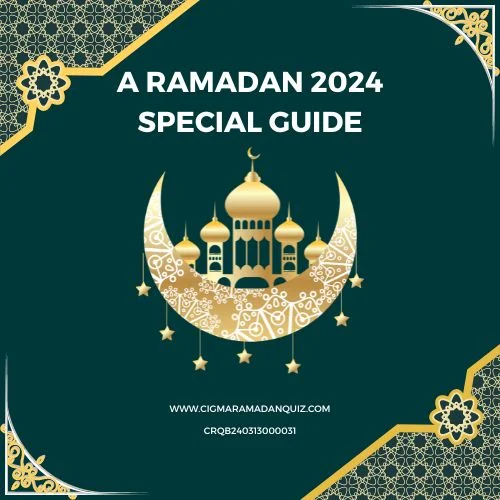
Ramadan 2024, the most convenient time for us to take a backseat and reassess our priorities in this Dunya. The perfect time to let go of the sins that hold us back and beg for forgiveness of all the bad deeds done throughout the duration of our lives. By consciously practicing gratitude throughout Ramadan Kareem, Muslims can deepen their connection with Allah (SWT), enhance their spiritual experience, and carry these positive feelings forward into the rest of the year of Ramadan 2024.
The lessons learned and the positive habits cultivated during this holy month don’t have to disappear with the Eid celebrations. The goal is to make gratitude a permanent fixture in your life.
So here we are, with a brand new article, with a new message to spread about the beauty of gratitude and how it transforms a person…specifically since Ramadan inspires people to try and change for the good.
Also Check : When is Ramadan 2024

Why is Gratitude Important in Ramadan 2024 ?
The Quran emphasizes the importance of gratitude throughout its verses. Surah Al-Baqarah [2:152] states, “And remember Allah upon entering the House [Kaaba], and [remember Him] after you are given what you were yearning for.” Gratitude is not just about thanking Allah (SWT) for the blessings we readily see, but also acknowledging the countless unseen favors He bestows upon us.
Ramadan Fasting during Ramadan Kareem allows us to experience hunger and thirst firsthand. This experience cultivates empathy for those less fortunate and reminds us of the simple blessings of food and drink that we often take for granted. By expressing gratitude for these basic necessities, we increase our awareness of Allah’s (SWT) immense provision.
Also Check : Ramadan Mubarak 2024

How to Be Grateful in Ramadan Kareem ?
This could be anything from good health and loving family to the opportunity to observe Ramadan Kareem itself. Keeping a gratitude journal can be a helpful tool for recording your reflections. Record your actions everyday and write down the things you feel especially satisfied and content about. You won’t understand the things you are grateful about unless you jot them down. That way, when you feel disgruntled and dissatisfied, remind yourself to look through your journal to remember all the things that make you happy and feel blessed about.
While hunger and thirst can be challenging aspects of Ramadan fasting, view them as opportunities to appreciate the gift of sustenance. Reflect on how grateful you are to break your fast each evening and savor the simple act of eating and drinking.
Throughout your daily prayers, take a moment to express sincere gratitude to Allah (SWT) for all His blessings. Thank Him for the ability to fast, for your loved ones, and for the countless other gifts in your life.
Giving charity (Zakat and Sadaqah) is a cornerstone of Ramadan 2024. By sharing your resources with those in need, you not only fulfill a religious obligation but also express gratitude for your own blessings.
Take time to connect with family and friends during Ramadan. Express your gratitude for their presence in your life and cherish the shared moments of prayer, meals, and gatherings.
Cultivate a more mindful approach to your daily activities during Ramadan Kareem. Savor the pre-dawn meal (Suhoor time) and the breaking of the fast (Iftar time). Be present during prayers and recitations, focusing on their spiritual significance.
Ramadan Fasting requires patience and self-discipline. By expressing gratitude for the strength to persevere through challenges, you find yourself becoming more confident and develop a more positive and appreciative mindset.
Also Check : Rules of Taraweeh Salah and Taraweeh Ki Dua
Gratitude and Ramadan
Ramadan Kareem is a beautiful time for Muslims to reconnect with their faith and appreciate the many blessings in their lives. By consciously practicing gratitude throughout the holy month of Ramadan 2024, you can unlock a wealth of spiritual and emotional benefits.
The key takeaway isn’t just about appreciating the deliciousness of the Iftar meal or the comfort of family gatherings, though those are certainly blessings to be cherished. The true power of gratitude in Ramadan lies in cultivating a deeper appreciation for the very essence of life itself – the ability to experience hunger and thirst, the joy of breaking the fast, and the privilege of connecting with Allah (SWT) through prayer and devotion.
Think of Ramadan Kareem as a training ground for gratitude.
It’s a time to break free from the autopilot mode of daily life and truly appreciate the simple joys and divine gifts that surround us. By taking the time to reflect and express thankfulness for these blessings, we not only deepen our connection with Allah (SWT) but also cultivate a more positive and content outlook on life.
Remember, gratitude isn’t a feeling; it’s a conscious choice. During Ramadan 2024, we actively choose to focus on the good in our lives, even when faced with challenges like hunger and thirst. This practice strengthens our resilience and reminds us that even during difficult times, there is always something to be grateful for.
Also check : Ramadan Fasting 2023-24
Conclusion
Remember, gratitude is a contagious emotion. When you express thankfulness to others, it inspires them to do the same. By sharing your positive outlook, you can create a ripple effect of gratitude that spreads throughout your family, community, and beyond.
So, as Ramadan 2024 comes to a close, don’t let the spirit of gratitude fade away. Carry the lessons learned and the positive habits cultivated throughout the holy month into the rest of the year. Express thanks to Allah (SWT) for His countless blessings, appreciate the good in your life, and share your gratitude with those around you. By making gratitude a cornerstone of your life, you’ll not only enrich your own journey but also inspire others to do the same. May this Ramadan Kareem be a stepping stone towards a life filled with gratitude, happiness, and a deeper connection with Allah (SWT).
